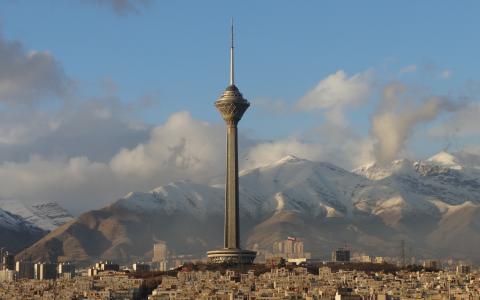
A Middle East conflict fomented by Iran, rather than the coronavirus outbreak cascading across the global economy, is the biggest risk to worldwide stability that may “doom” President Donald Trump’s reelection bid, Nouriel Roubini told Yahoo Finance.
Famously known for his gloomy financial prognostications, the Iranian-born economist also known as “Dr. Doom” predicted that Iran’s “number one objective” is to remain in power, especially in the wake of a rising COVID-19 infections within the country that may threaten the regime’s hold on power.
“Four more years of Donald Trump, and between sanctions and military pressure they’re going to collapse,” Roubini told “On the Move” in a wide-ranging interview on Friday.
“So what can they do?” he asked. “They can escalate tensions ...regionally and with the United States” as a way to reignite oil prices, trigger a worldwide recession — all of which would undermine Trump’s reelection chances, amid a market that’s in the throes of a historic sell-off.
Tensions between Tehran and Washington have been elevated since Trump took office, but entered a more dangerous phase in January, after a U.S. drone strike killed Qasem Soleimani, a top-ranking Iranian commander.
Meanwhile, Iran is widely perceived to have been the driving force behind the September drone strike that briefly incapacitated Saudi Arabia’s oil production and sent crude on a tear.
As historical precedent, Roubini cited how Iran figured prominently in prior U.S. elections decades ago. The 1973 oil embargo and the Iranian revolution of 1979 were geopolitical shocks that spurred oil prices, triggered an economic downturn — and saw incumbent presidents Gerald Ford and Jimmy Carter fall to upstart challengers.
Roubini speculated that Iran would use “asymmetric warfare” to destabilize the region.
And with that, the world’s largest superpower will find itself “sucked into the conflict, and it becomes a regional and global conflict, then Trump is doomed,” Roubini noted.
The COVID effect
Iran is already implicated in cyber attacks against U.S. interests, Annie Fixler, deputy director of the Center on Cyber and Technology Innovation at the Foundation for Defense of Democracies,” noted in a recent analysis.
“State-sponsored Iranian cyber operations are likely to continue, either in direct response to Soleimani’s death, in reaction to U.S. economic pressure, or in pursuit of other regime interests,” Fixler wrote.
“Cyber operations are a key pillar of Iran’s strategy, which relies on asymmetric capabilities to battle its more powerful adversaries,” she added.
Roubini argued that a U.S. air campaign against Iran wouldn’t work, “unless you send one million boots on the ground,” the economist said — something the U.S. has no apparent appetite to do given its desire to exit armed conflicts in the Middle East.
Barring that, “the regime is going to survive,” Roubini noted.
“It is in the interest of Iran to provoke the United States, Israel and the allies, to create chaos, spike oil prices... crush the market, create a recession and then you get rid of Donald Trump,” he added.
The impact of the coronavirus on Iran, where deaths from the pathogen have surged since the first reported case a week ago, is a wildcard that makes the hard-line government even more unpredictable.
Calling the economic and domestic risks “significant,” Eurasia Group analyst Henry Rome said last week that the country faces the prospect of a deep economic crisis.
“If the outbreak is contained quickly, trade should bounce back relatively quickly. If the interruptions are prolonged and Iran re-enters a deep recession, the odds of opening up negotiations with the U.S. this year in the hope of sanctions relief will likely increase from the current low level of 15%,” Rome wrote.
With a restive population already challenging the Iranian government’s legitimacy, Roubini believes Tehran will fan more flames of instability in the turbulent region.
“In the case of China they have damaged the economy [and] they have to find a scapegoat,” Roubini told Yahoo Finance. “In the case of Iran, [they] have a damaged economy, a damaged regime and they have to lash out. That actually makes an attack even more likely.”
This article originally appeared on Yahoo! Finance.



